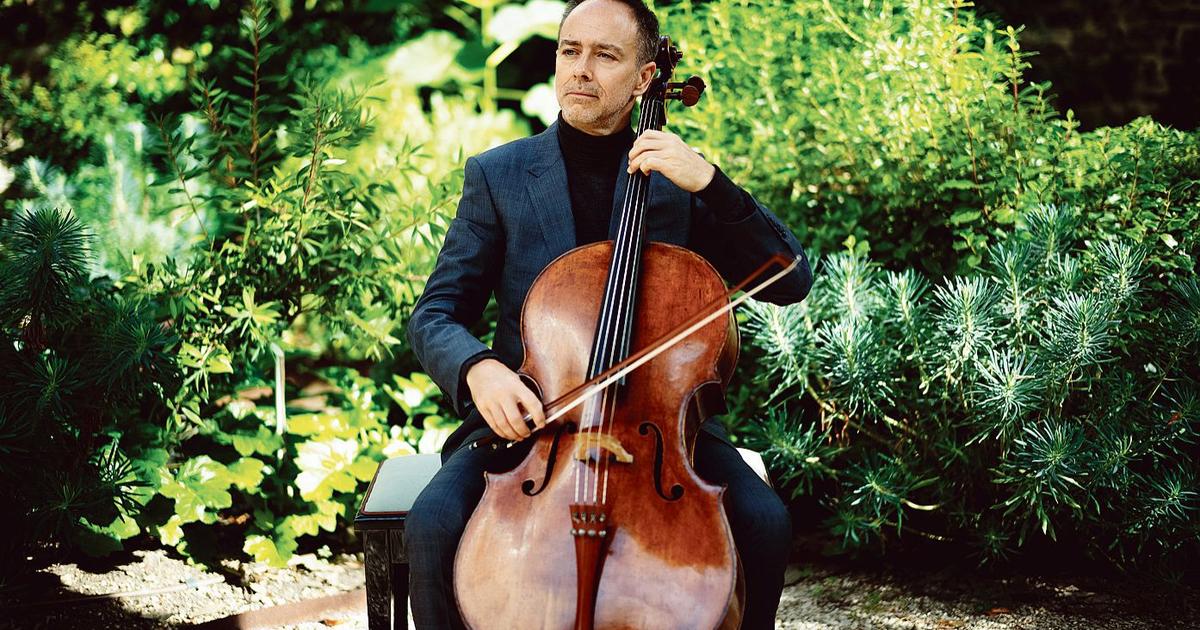Claire Oppert takes the cello out of its case.
Installs on a chair.
Suspend his bow for a moment in the air.
The notes of the Adagio d'Albinoni fly away in this hospital room in Puteaux (Hauts-de-Seine).
A smile passes over Lahoucine's face.
His hands relax.
The crease in his forehead relaxes.
His breathing is growing.
That's it, his big black eyes close.
After a few measurements, the cancer disappeared.
Lahoucine is no longer this bedridden patient, exhausted by the disease.
The blue-gray gaze of the cellist lights up when she speaks of it: “Music is addressed to the living part of the being, to that which is not sick.
It is this part that resonates.
"
"Here, we prescribe music sessions"
Claire Oppert, 54, silhouette of a dancer, face as soft as her voice and honey-colored hair, has for more than twenty years reconciled her concerts around the world and the music therapy sessions she gives in the privacy of hospitals or nursing homes.
She tells in "the Pansement Schubert"
,
a story published in January 2020, this experience of caring musician.
And "the mysterious paths taken by music, when it reaches right in the heart those we call profound autism, nursing home residents, demented patients, painful patients and at the end of their life".
READ ALSO>
"They were very caring": when the hospital moves to palliative care patients
For three years, his cello has resonated in the corridors of the palliative care service of the Rives de Seine hospital in Puteaux.
Claire Oppert also joined in January the team of the medical house Jeanne Garnier in the 15th arrondissement of Paris.
Every Monday - in the morning in Paris, in the afternoon in Puteaux - she goes from room to room distilling her melodies to patients at the end of their life.
Newsletter The essential of 92
A tour of the Hauts-de-Seine and IDF news
Subscribe to the newsletterAll newsletters
Mélanie Monribot, one of the two doctors in the Puteaux unit which has 12 beds, slips it with a smile: “Here, we prescribe music sessions.
"Claire Oppert intervenes without a prescription," but it is an integral part of our care ".
Claire Oppert always takes stock with the care team of the palliative care service at Puteaux hospital before starting her sessions.
LP / Olivier Lejeune
"It brings moments of well-being, emotion and life," adds Doctor Ségolène Perruchio, the head of department.
This helps, in a very large number of cases, reduce anxiety and pain.
"
"10 minutes of Schubert = 5 mg of Oxynorm"
Jean-Marie Gomas, another doctor, former head of the palliative care service at Saint-Périne hospital in Paris - where the concert performer walked her instrument for 9 years - sums up the “Oppert effect” with a phrase: “ 10 minutes of Schubert = 5 mg of Oxynorm.
»A pain reliever related to morphine.
Claire Oppert checked it for the first time in April 2012. On the first floor of the demented residents of the Ephad Korian Jardin d'Alésia, in the 14th arrondissement.
The musician animates there at the time of the workshops.
That day, when she enters the room which serves as a common space, "a woman screams and struggles".
Two nurses try to change his bandage.
The wound on his right arm is festering.
Without thinking, Claire Oppert stops in front of her.
And begins to play the theme of the andante of the famous Trio op.
100 from Schubert.
"Barely three seconds go by, maybe two bars, and her arm relaxes," she recounts in the prologue to her book.
The treatment ends in peace.
And one of the nurses says: “We will absolutely have to come back for the Schubert dressing.
The expression will become the title of Claire Oppert's work.
It will also give its name to a clinical study carried out in the palliative care unit of Sainte-Périne hospital.
The cellist began to play there in 2011. She completed a six-month internship to validate the university degree in art-therapist that she followed at the University of Tours.
Jean-Marie Gomas, who has just retired after 25 years at the head of this service, has already seen several art therapists, but “a lot of broken arms”.
When Claire Oppert - "this sunny, charismatic and excellent musician" - arrives "the look of the team changes".
Jean-Marie Gomas knows the importance of music “on a theoretical level”.
“But I hadn't realized how much she could upset people,” he breathes.
"It's not just playing for the little old people who are bored"
At the end of the internship, he cannot bring himself to let his intern go.
The doctor is fighting to obtain funding through the association of the service.
He managed to pay the musician and get her to come first once every two or three weeks.
Then every week.
Meanwhile, Claire Oppert unwittingly performs her first Schubert dressing at the Ephad.
She talks about it to Jean-Marie Gomas.
The doctor and the cellist develop the protocol.
And launched a study from 2013. In three years, the team produced 112 “Schubert dressings”.
The principle: carry out a nursing treatment with Claire Oppert and her cello and without her, the next day or the day before to compare.
The caregivers note the heart rate, facial expression, muscle relaxation ...
“Music induces what is called a sensory counter-stimulation,” explains Jean-Marie Gomas.
When your attention is diverted you feel less of your symptom.
"And the doctor insists:" The goal is not to reduce the doses of morphine.
What we are really looking for is patient satisfaction.
"
The results published in 2016 validate what Claire Oppert had felt.
Music allows a "reduction in patient pain by 10 to 50%," lists the cellist in her book.
“The positive effects on patient anxiety are estimated at nearly 90%.
The positive effect on caregivers is 100%.
"
Jérôme Pernoo, cellist and professor at the conservatory now has his students study “Le Pansement Schubert”.
“For them, it is a lever for deep reflection on their usefulness in society.
We always say that music softens manners, it's a bit of a custard tart.
Claire's experience shows us that it has a real effect and that it's not just going to play for the little old people because they are bored.
"
"She revealed what for me was obvious"
Like many musicians, this longtime friend of Claire Oppert, trained like her at the Moscow Conservatory, regularly plays in hospitals.
“But it's difficult, we are not trained for it.
We don't always know how to behave.
With Claire, I think there is something natural.
"
Claire Oppert has been part of the healthcare team of the Puteaux palliative care service for three years.
LP / Olivier Lejeune
As far back as she can remember, Claire Oppert has always wanted to heal.
In the family, it's like second nature.
Her grandfather, father and brother are doctors.
Art and music are never far away.
Her mother is a dancer.
His father, a doctor, a "very atypical" artist, plays the piano for his patients.
Opera and theater rock Claire Oppert's childhood in Paris.
At 14, she gave her first concert in Saint-Germain-en-Laye.
A livid woman, with a turban on her head, comes to greet her at the end.
“If you had been a doctor, you would have healed me.
"
The low light at the end of the day illuminates the profile of Claire Oppert.
She put her instrument down in a corner of the doctors' office at the Puteaux palliative care service.
“It was all in this woman's gaze.
She revealed what to me was obvious.
"
His cello exploded with a punch
Very soon, she will knock on all doors.
She plays in prisons, in hospitals, in nursing homes.
The adolescent dreams of being a writer, musician or doctor.
She finally enrolled in philosophy university and went on to master's degree.
Before winning a scholarship to study at the Tchaikovsky Conservatory in Moscow.
She spent four years in very difficult material conditions "between the cold, the filth and the rats".
But she's learning a lot.
Claire Oppert began her concert career immediately.
Treatment will come back in her life one evening in 1996. She goes to an art and medicine colloquium in the Louvre auditorium.
Howard Buten is one of the speakers.
This psychologist, a great specialist in autism in the city, clown Buffo on the stage, fascinates the musician.
“He gave off something that I had never encountered.
So original and quirky and at the same time very serious and totally invested.
"
READ ALSO>
Seine-Saint-Denis: Daoud and Stéphane inspired the film “Hors Normes”
Howard Buten is in the process of founding the Adam Shelton center, a medico-educational institute which welcomes young autistic people in Saint-Denis (Seine-Saint-Denis).
Claire Oppert immediately wanted to work with him.
For six years, she played for Paul, Dîlan, Amélia, David… Her instrument will be exploded with a punch, she will be hit on the stomach, she will be scratched until she blows.
Whatever.
His cello stands like “a bulwark against absurdity, disease and death”.
Claire Oppert completes “Swan Lake” by Tchaikovsky.
In the small hospital room, Lahoucine and her daughter have tears in their eyes.
"Thank you," they whisper.
The musician gently closes the door.
For four years she was trained the hard way at the Moscow Conservatory.
“Everything I suffered there, I think it was for.
"








